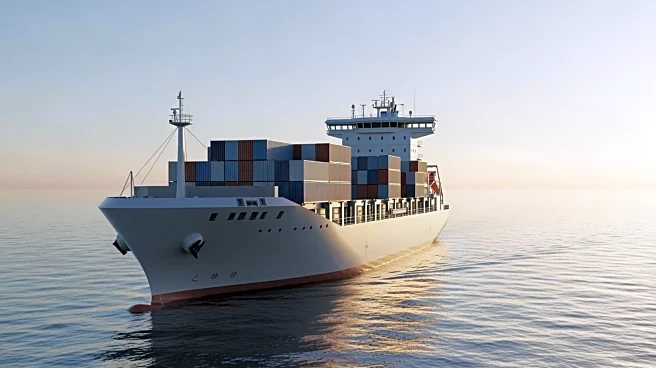What's Happening?
Stena Line has officially named its newest vessel, Stena Connecta, at the CMI Shipyard in Weihai, China. The vessel is set to embark on its maiden voyage to its new home port on the Irish Sea. Stena Connecta, alongside
Stena Futura, which began service in September, will increase freight capacity by 40% on the Belfast–Heysham route. The vessel is a New Max RoRo ship designed for maximized freight capacity, featuring 2,800 lane meters across its 147-meter length. It employs a multi-hybrid propulsion system that utilizes battery power, biofuel, and methanol, and is equipped with two Norsepower Rotor Sails that can save up to 9% in fuel on its route. The delivery voyage from China to the Irish Sea is expected to take several weeks, with regular service commencing in January 2026.
Why It's Important?
The introduction of Stena Connecta is significant for the shipping industry, particularly in enhancing freight capacity and promoting sustainable maritime practices. The vessel's advanced propulsion system and rotor sails represent a shift towards greener shipping solutions, potentially reducing fuel consumption and emissions. This development is crucial for the Belfast–Heysham route, which will benefit from increased capacity and efficiency. The move aligns with global efforts to decarbonize maritime transport, offering economic and environmental benefits. Stakeholders in the shipping industry, including freight companies and environmental groups, stand to gain from these advancements.
What's Next?
Stena Connecta will soon begin its delivery voyage to the Irish Sea, with regular service expected to start in January 2026. The shipping industry will likely monitor the vessel's performance closely, particularly its fuel efficiency and environmental impact. As the vessel enters service, it may prompt other shipping companies to adopt similar technologies, further advancing the industry's sustainability goals. The successful integration of hybrid propulsion systems could lead to broader adoption across the sector, influencing future ship designs and operational strategies.
Beyond the Headlines
The launch of Stena Connecta highlights the growing importance of sustainable practices in the maritime industry. The use of hybrid propulsion systems and rotor sails not only reduces environmental impact but also sets a precedent for future vessel designs. This shift may encourage regulatory bodies to implement stricter emissions standards, pushing the industry towards more eco-friendly solutions. Additionally, the increased freight capacity could stimulate economic activity along the Belfast–Heysham route, benefiting local businesses and communities.









